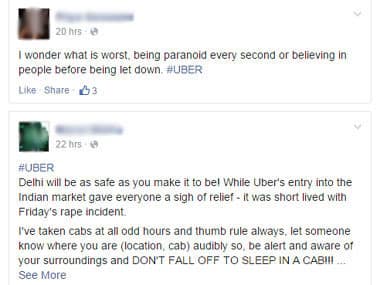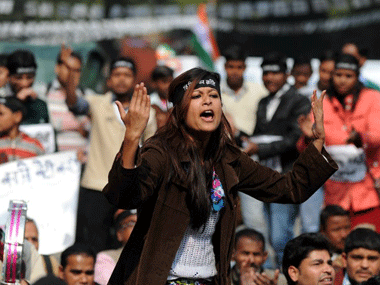So it was Friday, finally! A (let’s call her that), let out a sigh like the rest of the world, collected her stuff and hurried out of office. She grabbed a quick dinner with a friend and then headed to a pub nearby. A couple of drinks later, she orders her cab – early since it was only 10 pm and heads home after a long day. Once inside the cab, weariness gets the better of the intense paranoia that is an integral part of an average Indian woman’s don’t-get-raped survival manual. So, she dozed off… Now, does A sound familiar? Oh yes, she does. She could be your colleague, your best friend, your sister, the flatmate or the neighbour’s daughter. She could be you. [caption id=“attachment_1839363” align=“alignleft” width=“380”]  Protest against rape. Agencies.[/caption] The 27-year-old employee of an MNC who allegedly got raped in Delhi, inside a Uber cab by the driver, is exactly like us. And like us, she did all the safety checks within her power to make sure she reached home from a Gurgaon pub unscathed. In fact she was willing to pay that extra bit to make sure no one hurt her. She got into a cab whose service is supposed to monitor its drivers’ whereabouts and her cab’s route like a benevolent Big Brother. But hurt, she was, like we now know. But what was India’s most-discussed takeaway from the incident? Never doze off in public transport. On Twitter and Facebook, after the initial shock over the laxity of a registered taxi service operator, people are back to pointing fingers at the victim. They asked the December 16 gangrape victim, why she had to get on to an empty private bus? Or go for an evening show? They asked the Shakti Mills gangrape victim, why she had to visit a deserted mill in Mumbai, even if for work? Now, they are asking the this victim, why pray, did she nod off in a cab? Cue for mothers to start making those anxious long-distance calls to daughters living alone in other cities and warning in grave voices how drinking and being driven can be just as dangerous as driving after drinking. Hindustan Times reports: “Sunday began on a similar note for hundreds of women in the city — with parents or partners telling them how unsafe it was to take a cab and if they must take cabs, they should always be alert. They should be on the phone with someone they trust —preferably male. The number of the taxi and the driver should be sent to 2-3 people too, they were warned.” Really? Is that a practical way to live on a daily basis? Following are some of many tweets and FB status updates which said pretty much the same.
 In the present light of things, perhaps it sounds like a legitimate exercise to indulge in - grade the day’s activities as can-get-me-raped and shouldn’t-get-me-raped. Perhaps, that might keep us safe, help us come closer to the right foolproof safety strategies, right? Wrong. Because what you are effectively asking a woman to do, is not just be concerned about her security but give up every semblance of control and mobility in her life. You are telling her that she might be living in a democracy, but her right to freedom of movement can only exist when some well-meaning men decide to escort her around town. Questions like should she have dozed off or should she have gone for the late show do not make women safer. Shouldn’t we ask the right questions, instead? Several reports have now revealed how the Uber’s own safety apparatus is fragile and could be easily violated. Given the amount of media coverage Uber got with its launch, did anyone bother to even point this out back then? Obviously, not enough. One difference between a taxi service like Uber and the general black-and-yellow cabs we use is that the latter don’t always come with central-locking. The driver, in that case, has no way of locking a passenger inside unless he does it manually and that can be a little tricky. A service like Uber always has cars with central locking systems making it highly possible for any passenger to be trapped by drivers. Before giving these services permission to operate, isn’t it the duty of the government to ponder its ramifications? Let’s give credit when it is due. The Delhi police has shown astonishing alacrity in tracking down and punishing the suspect, and from the victim’s account, their first-response team did everything by the book, including filing the FIR. Also heartening is the fact that Home Minister Rajnath Singh offered a respectful account of the incident without dwelling on unnecessary details about bars or drinks. Perhaps some of the Twitterati could take their cue from Singh who made it clear that the circumstances leading up to the rape were irrelevant. The message here is that safety is not about putting ever more restrictions on how a woman gets from point A to point B. Instead of shaking our heads at the lack of responsibility of a woman, we have to start talking about her rights, especially the right to free movement. As countless incidents where women have been raped and killed despite being escorted by men, in broad daylight and at night, at home and on the street, in an auto and now a fancy cab, we know that in India there is no such thing as better uber safe than sorry.


)
)
)
)
)
)
)
)
)



